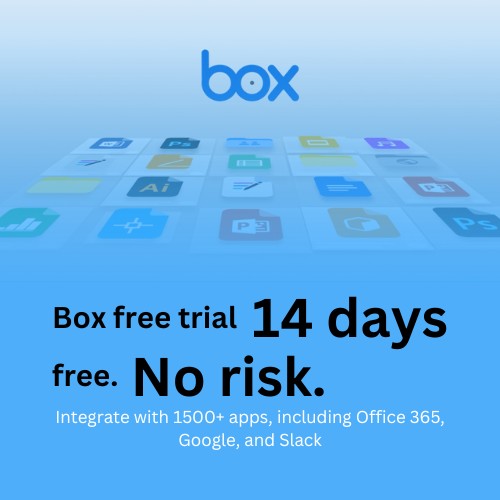
Enjoy Seamless File Sharing With Best-In-Class Service Provider
- Collaborate and share
- Protect sensitive data
- Cloud storage, e-signatures, and whiteboarding
- Automate tasks with no-code workflows

- Upload files upto 150GB
- 100K API calls per month
- 1,500+ app integrations
- Unlimited Storage
See More Info
Box Inc. excels in this vertical, from file sharing to managing your workspace. Click here to experience the flexibility in working.
Why Do We Recommend it?
-
Box Shuttle- Migrate Content to 15 source systems
-
Box Notes- Create Structured project plans
-
Box Canvas- Virtual Whiteboarding tool
-
Box Sign- E-signature service
-
Box Relay- Create Flexible workflows
-
Box Sheild- Data Leak Protection and Cyber Threat Detection
-
AI-Assistance- AI-powered content management
Pros
- Deep OS integration
- Top security protection
- 10GB free cloud storage
Cons
- Can get costly
- Limited consumer options
- Some feature overlap
Now that you have weighed in on the up and down sides, let us learn how it fares against giants of the market.
Box Vs. DropBox
Box
- 10 GB of free storage space.
Unlimited storage space for paid.
Supports more types of file formats.
Remote uploading of 30 MB per file via IFTTT.
DropBox
- 2 GB of free storage space
2 GB space is free, 5 TB paid.
Supports fewer types of file formats.
It does not support remote uploading.
Box Vs. One Drive
Box
- Offers 10 GB of free storage space.
Unlimited storage space for the paid version
It is used for professional as well as personal storage.
100 GB for personal accounts, unlimited for business a/c.
The maximum file is 250 MB for free and 150 GB for paid.
One Drive
- Offers 5 GB of free storage space.
There is limited storage space for the paid version.
Professionals mostly use it.
It can provide paid storage space of a maximum of 6 TB.
The maximum file size in OneDrive is 250 GB.
Get Started
How Businesses Can Benefit from It?
1. Data Management: Within a business, numerous departments generate a significant volume of records and documents. Storing these in physical format poses several challenges, including the risk of damage or misplacement.
2. Increases Productivity: Hybrid and remote working is the new trend in working professionals’ lives, as it allows them to work wherever they require without any need to commute.
3. Enhances Security: The most important benefit of cloud storage is it makes your documents more secure. To access documents or any kind of information on cloud storage it requires to take permission.
4. Better Collaboration: In companies with multiple departments and thousands of employees working under the same roof, collaboration becomes difficult in terms of data sharing and information exchange.
5. Data Recovery: Sometimes, it happens that it might be due to some technical or cyber security issues. Companies can lose important information, but the cloud storage system helps them recover the data within seconds and start work again from the point where they left it.
6. Scalability: As the organization grows, data parallelly grows, and to manage it, you need to buy some extra space.
Frequently Asked Questions
What is a cloud content management storage platform?
A cloud content management storage platform is a service that allows individuals and organizations to store, manage, share, and collaborate on files and data over the internet. These platforms provide scalable storage solutions and enable users to access their content from anywhere.
What are the benefits of using a cloud storage platform?
Key benefits include scalability, accessibility, collaboration, cost-effectiveness, security, and data backup. Users can easily share files and collaborate in real time, while the platform ensures data is secure and backed up.
How secure is cloud storage?
Cloud storage platforms typically offer robust security features, including data encryption, two-factor authentication, and access controls. However, users should review the platform’s security measures and ensure they comply with their organization’s security policies and industry standards.
Can I access my files offline?
Some cloud storage platforms offer offline access, allowing users to sync files to their devices and access them without an internet connection. Changes made offline are usually synced once the device reconnects to the internet.
What is the difference between cloud storage and cloud backup?
Cloud storage provides a centralized location for storing and accessing files, while cloud backup is a service that automatically copies and stores data to protect against data loss. Cloud storage is typically used for active file management, while cloud backup is for disaster recovery.
How do I share files using a cloud storage platform?
Most platforms allow users to share files by generating a shareable link or inviting collaborators via email. Users can usually set permissions to control who can view, edit, or comment on the shared files.
What happens if I exceed my storage limit?
When you exceed your storage limit, the platform may restrict uploading new files until you free up space or upgrade to a higher storage plan. Some platforms may offer options to purchase additional storage.
Are cloud storage platforms suitable for businesses?
Yes, cloud storage platforms offer business-specific features like enhanced security, team collaboration tools, and integration with other business applications, making them suitable for organizations of all sizes.
Can I migrate my data from one cloud storage platform to another?
Data migration is possible but may require additional tools or services to ensure a seamless transition. Some platforms offer built-in migration tools, while third-party services can assist with more complex migrations.
How is data integrity maintained in cloud storage?
Cloud storage platforms use various techniques to ensure data integrity, such as checksums, data replication, and regular integrity checks, to protect against data corruption and loss.
Our Best Pick





